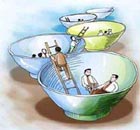World Business
Recession receding, says BOJ
By Mayumi Otsuma (China Daily)
Updated: 2010-04-22 13:20
 |
Large Medium Small |
TOKYO - Bank of Japan Deputy Governor Kiyohiko Nishimura said the country's economic recovery is beginning to stem deflation and the central bank should persist with its accommodative monetary policy.
"Some beams of light are starting to break through a thick cloud of deflation," Nishimura said in a speech in Sendai, northern Japan on Wednesday. "The effects of the pickup in the economy since the spring of 2009 can be considered to spread over to prices only from now on."
Nishimura's remarks echo comments made this month by Governor Masaaki Shirakawa, and may add to speculation that the central bank will raise its outlook for the economy and prices next week. Recent reports show the export-led rebound in spreading, with the unemployment rate at the lowest level since March 2009 and consumer confidence at a two-year high. "The risk for the economy's second dip has diminished," Kyohei Morita, chief economist at Barclays Capital in Tokyo, said before the speech. "Capital investment has been improving steadily in recent months, and we expect a recovery will reach households" later this year, he said.
Nishimura said there are "some changes in the trend of prices", reflecting the improvements in the economy and the way companies set prices. The risk of a return to a recession has dwindled, he said, while adding that the central bank hasn't reached the limit of its available monetary easing tools.
"The stagnation of the economy as symbolized in deflation is a deep-rooted problem," the deputy governor said. "It is important, while significant effects are not seen immediately, to consistently maintain accommodative monetary conditions."
The yield on Japan's 10-year bond rose one basis point to 1.335 percent at 3:01 pm in Tokyo. The yen traded at 93.23 per dollar from 93.22 late on Tuesday.
Shirakawa said this month that the likelihood of another economic slump had "pretty much gone" and there are increasing "positive" signs for prices, while also declining to forecast an end to deflation.
The central bank doubled a lending program for commercial banks to 20 trillion yen ($214 billion) in March amid persistent deflation and as Finance Minister Naoto Kan led government calls for more action.
Political pressure on the bank to do more persists. The ruling Democratic Party of Japan yesterday said it will call for an inflation target in its platform for July upper house elections. Kan said on Tuesday that the central bank should aim for inflation of as high as 2 percent.
When asked whether the BOJ might adopt an inflation target, Nishimura said the current policy framework is "the best", while adding that the board is open to refining it.
The central bank's current policy stops short of an inflation target, with the board regarding prices as stable within a positive range of up to 2 percent, with a median estimate of 1 percent. Consumer prices excluding fresh food, the bank's key inflation measure, declined 1.2 percent in February from a year earlier, the 12th straight drop.
"We can't predict the BOJ's policy direction just based on its assessment of the economy and prices" and the bank may expand the lending program further as government pressure mounts, said Hiroaki Muto, a senior economist at Sumitomo Mitsui Asset Management Co. in Tokyo.
Bank of Japan policy makers will next meet on April 30. They have kept the benchmark interest rate at 0.1 percent since December 2008.
Bloomberg News













